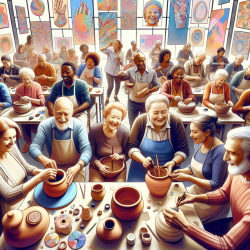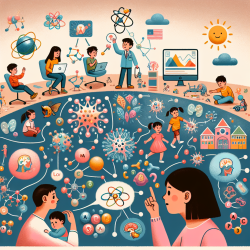Art has long been recognized as a powerful medium for expression and healing. Recent studies, such as the one conducted at the Montreal Museum of Fine Arts (MMFA), have highlighted the significant impact that participatory art-based activities can have on the mental and physical health of older adults. This blog post explores these findings and offers insights into how practitioners can harness the power of art to improve well-being among this demographic.
The Research: A Closer Look
The study titled "Effects of 'Thursdays at the Museum' at the Montreal Museum of Fine Arts on the Mental and Physical Health of Older Community Dwellers" utilized a randomized clinical trial (RCT) design to evaluate the benefits of art-based activities. Participants engaged in a 3-month cycle of weekly workshops, each lasting two hours, where they explored various artistic techniques in a group setting.
The results were promising. Participants in the intervention group showed significant improvements in well-being, quality of life, and physical health compared to those who did not participate. These findings suggest that art-based activities can be an effective intervention for preventing frailty and promoting overall health in older adults.
Implementing Art-Based Activities in Practice
For practitioners interested in incorporating art-based activities into their programs, here are some key takeaways from the study:
- Create a Supportive Environment: Ensure that the setting is conducive to creativity and expression. The MMFA workshops were held in a dedicated space that encouraged participation and interaction.
- Focus on Group Dynamics: Group activities not only foster social interaction but also enhance the therapeutic effects of art-making. Encourage participants to share their work and experiences with one another.
- Diversify Artistic Techniques: Offer a variety of artistic mediums to cater to different interests and abilities. The MMFA workshops included abstract painting, live model drawing, and stained-glass painting.
The Broader Implications
This study underscores the potential for museums and cultural institutions to play a pivotal role in public health promotion. By partnering with healthcare providers, these institutions can offer innovative programs that address both mental and physical health needs.
The success of "Thursdays at the Museum" also highlights the importance of interdisciplinary collaboration. By integrating expertise from fields such as geriatric medicine, psychology, and art therapy, practitioners can develop comprehensive interventions that address the complex needs of older adults.
A Call to Action
The positive outcomes observed in this study provide a compelling case for further research into art-based interventions. Practitioners are encouraged to explore similar programs within their communities and contribute to the growing body of evidence supporting the health benefits of art.
If you're interested in learning more about this groundbreaking research, you can read the original paper by following this link: Effects of “Thursdays at the Museum” at the Montreal Museum of Fine Arts on the mental and physical health of older community dwellers: the art-health randomized clinical trial protocol.










